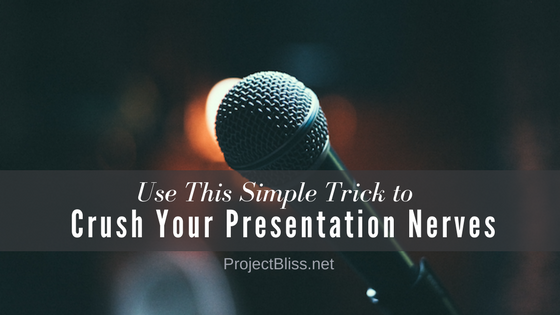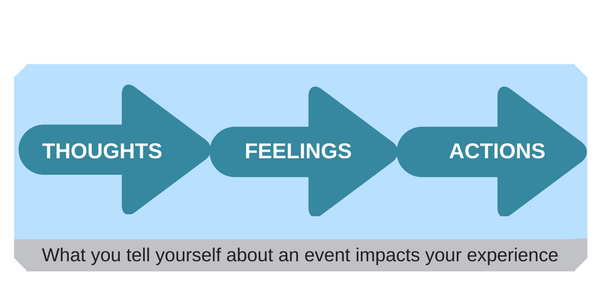Use This Simple Trick to Crush Your Presentation Nerves
Do you get anxious at the idea of giving a presentation?
Do you avoid speaking in public due to presentation nerves?
Whether you’re actively seeking ways to get more visibility for career growth, or you’ve been asked by your boss to give a presentation, getting in front of people can be scary.
There’s an often referenced survey revealing more people fear public speaking than death. Though it was not a rigorous scientific study, the thought of getting up in front of people can be nerve-racking.
And even more so if it’s a large crowd or you’re speaking in front of high-level executives.
Even small group discussions can be scary if you’re intimidated by the audience.
I once sat in a meeting with a company vice president I’d had multiple meetings – and a good rapport – with. A peer was presenting information about a project in a rather relaxed group setting. I was surprised to see the presenter exhibit signs that he was nervous. His voice was shaky. He fidgeted. He avoided eye contact.
It hadn’t occurred to me that speaking to small groups could be just as stressful as large ones.
Whether your public speaking involves a big presentation or talking with a smaller group, you don’t want your stress to distract from your message.
If you have similar anxieties, and you’ve tried approaches to calm your nerves before giving a presentation without success, here’s another approach to try. You may find it works much better.
What to Do If You Have Presentation Nerves
The next time you know you’ll have to perform in front of a group, large or small, and you’re nervous about it, do the following:
Tell yourself you’re excited.
It’s as a simple as that.
Change the dialogue you have with yourself to change the way you feel about it.
Instead of feeling those knots in your stomach and that tightness in your chest and saying, “there’s no way I can go through with this,” instead say “this is going to be so awesome.”
Several years ago before I had speaking experience, I asked for the opportunity to speak at a local conference. I wanted to get more experience and it would be a friendly crowd.
Even so, I was nervous at the idea of speaking to a roomful of professionals.
I remembered that I’d heard years ago that your body responds the same to fear and excitement.
I decided to test this out. Instead of sticking with the statement of “I’m really nervous about this,” I decided instead to say, “I’m excited! This is going to be so much fun!”
My body still had the same sensations, but after saying it a few times, my attitude about the presentation shifted. I looked forward to it. It worked!
I still continue to use this approach as I step out of my comfort zone to do scary things.
Why It Works
Studies show that your body responds to anxiety and excitement the same way. Those butterflies in your tummy and faster heart rate show up whether you’re nervous or excited.
The difference is “anxiety is characterized by negative appraisal, uncertainty, and a lack of control, whereas excitement is characterized by positive appraisal and optimism.”
When you’re nervous, you dread the event.
When you’re excited, you look forward to it.
But your body is reacting the same.
Presentation nerves and presentation excitement will create the same physical reaction.
It’s your thoughts that make the difference.
So how do you make the switch?
How to Shift From Presentation Nerves to Presentation Courage
When trying to calm your nerves before a presentation, you may find it hard to fight the reaction your body is having. It can be more effective to work with it instead.
Your presentation nerves are a result of the words you’re telling yourself.
Cognitive behavior therapy teaches that your thoughts create your feelings. What you tell yourself about an event has a direct impact on how you feel about it.
And this, in turn, impacts your actions.
You’ll come across as more confident.
You’ll likely be more motivated to do more presentations in the future.
And you’ll have more fun.
When I was a family coach years ago, I taught this to families as part of our regular sessions.
And I started using the technique myself throughout my day, from big events to those as small as sitting in traffic. I found that I experienced the same event differently, depending on how I thought about it. And I could change how I thought about it based on what I told myself about it.
I remember doing this intuitively when I had just finished grad school. I was giving a campus tour, and dreading it. I remember thinking that I could have a more positive attitude about it. I reminded myself that it was a lovely day on a beautiful campus, and it would be a nice walk. I suddenly felt much better about it.
(If you find this intriguing or want a great resource, I highly recommend Feeling Good: The New Mood Therapy, by David D. Burns.)
The difference is what’s going on in your thoughts.
Change How You Think About The Situation
If you interpret the situation as something to be truly threatening, you’ll have one dialogue – resulting in presentation nerves. If you interpret the situation as something to be enjoyed, you’ve got a different conversation going on in your head – resulting in joy.
Some people are afraid of roller coasters, and some love them. Zumanjaro: Drop of Doom is “the world’s highest drop ride, rocketing riders up 415 feet, pausing momentarily, then releasing them for a 10-second trip to the bottom at the vomit-inducing speed of 90 mph.” No thank you for me. But some people stand in line and pay money for this.
It’s what people believe about the experience that impacts how they approach it.
[bctt tweet=”It’s what people believe about the experience that impacts how they approach it. ” username=”@leighespy”]
Realize that it’s going to be awesome. You have an audience that wants you to succeed. You’ll grow from it and even if it doesn’t go as planned you’ll learn from the experience. Tell yourself it will be fun and that you can’t wait! Use words that feel right for you, but lean into it let those nerves be excitement instead.
Summary
Next time you’re set to present iatan event that gives you anxiety, shift your internal dialogue. Tell yourself that you’re excited instead. Your energy and arousal will still be up, but your attitude toward the event will be more positive.
You’ll likely find it works, and you may even seek out more opportunities to be in the spotlight.






